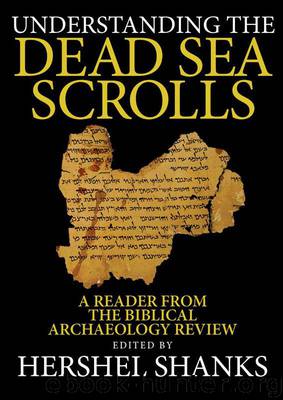Understanding the Dead Sea Scrolls by Hershel Shanks

Author:Hershel Shanks
Language: eng
Format: epub
Tags: Dead Sea Scrolls
ISBN: 9781935335580
Publisher: Biblical Archaeology Society
Published: 2012-01-18T13:00:00+00:00
Auras Design
This dogma of the Hebraica veritas may be found as early as the late first century of the Common Era, when Josephus, the Jewish historian, wrote:
We have given practical proof of our reverence for our scriptures. For, although such long ages have now passed, no one has ventured to add, or to remove, or to alter a syllable; and it is an instinct with every Jew, from the day of his birth, to regard them as decrees of God, to abide by them, and if need be, cheerfully to die for them.2
Josephus evidently regarded the Hebrew Bible as having, in theory at least, an immutable text.3
Origen, the Church Father, ordinarily used the Old Greek version of the Bible. But he, too, apparently assumed that his Greek Bible was translated from a Hebrew textual base that was the same as the rabbinical Hebrew text in current use in his day. Hence, in his monumental Hexapla* he carefully corrected his Greek manuscripts to be the Hebraica veritas—incidentally, with catastrophic results for the subsequent transmission of the Greek Bible.
Jerome, writing in the fourth century, applied the principle of “correcting to the Hebrew” to the Latin Bible, displacing earlier Latin translations (based on the Old Greek Bible) with a new Latin translation that has come to be called the Vulgate, a Latin version translated from the standard Rabbinic Recension of the Hebrew Bible in use in Jerome’s time.
The search for the early stages in the history of the text of the Hebrew Bible began to be pursued scientifically in the late eighteenth century, but the extant manuscripts were all of medieval date, and the results were disappointing for those who hoped to find traces of archaic forms of the text. The sifting of the medieval manuscripts yielded, in its mass of variant readings, no evidence of alternate textual families or text types. The variants were secondary* and of late date, the slips and errors of medieval scribes. Indeed, it could be argued that the theory of a fixed and unchanging Hebrew text was given added support by the evidence from the collections of medieval manuscripts.
Some of the more astute textual scholars, however, argued that all medieval Hebrew manuscripts derived from a single recension fixed early in the Christian era, and that this recension alone survived in the Jewish communities. Direct access to the early development of the text of the Hebrew Bible (prior to the recensions) was thus effectively blocked.4 Accordingly, the sea of variants in the great collections of manuscripts was of little or no help in the endeavor to recover ancient readings standing behind corruptions in the textus receptus.† It could be, and was, argued that the medieval text stemmed from a single archetype, or from single manuscripts of each biblical work, which already possessed the pattern of errors held in common by the medieval text.5
The fact is, however, that in the nineteenth century, there was little hard evidence to determine precisely the procedure by which the Rabbinic Recension, found in all medieval manuscripts, came into being and was promulgated.
Download
This site does not store any files on its server. We only index and link to content provided by other sites. Please contact the content providers to delete copyright contents if any and email us, we'll remove relevant links or contents immediately.
| Apocrypha & Pseudepigrapha | Dead Sea Scrolls |
The Five People You Meet in Heaven by Mitch Albom(2861)
Name Book, The: Over 10,000 Names--Their Meanings, Origins, and Spiritual Significance by Astoria Dorothy(2505)
Real Sex by Lauren F. Winner(2498)
The Holy Spirit by Billy Graham(2444)
The Secret Power of Speaking God's Word by Joyce Meyer(2268)
How The Mind Works by Steven Pinker(2241)
0041152001443424520 .pdf by Unknown(2241)
ESV Study Bible by Crossway(2179)
Ancient Worlds by Michael Scott(2120)
The Meaning of the Library by unknow(2082)
The Gnostic Gospels by Pagels Elaine(2047)
Churchill by Paul Johnson(2025)
The ESV Study Bible by Crossway Bibles(1997)
MOSES THE EGYPTIAN by Jan Assmann(1984)
Jesus by Paul Johnson(1901)
Ancient Near Eastern Thought and the Old Testament by John H. Walton(1861)
The Nativity by Geza Vermes(1859)
The Complete Dead Sea Scrolls in English (7th Edition) (Penguin Classics) by Geza Vermes(1855)
City of Stairs by Robert Jackson Bennett(1851)
